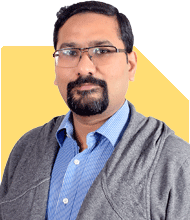Patrick Dsouza |1428 Answers |Ask -Follow
CAT, XAT, CMAT, CET Expert - Answered on Apr 29, 2024
Along with his wife, Rochelle, he trains students for competitive management entrance exams such as the Common Admission Test, the Xavier Aptitude Test, Common Management Admission Test and the Common Entrance Test.
They also train students for group discussions and interviews.
Patrick has scored in the 100 percentile six times in CAT. He achieved the first rank in XAT twice, in CET thrice and once in the Narsee Monjee Management Aptitude Test.
Apart from coaching students for MBA exams, Patrick and Rochelle have trained aspirants from the IIMs, the Jamnalal Bajaj Institute of Management Studies and the S P Jain Institute of Management Studies and Research for campus placements.
Patrick has been a panellist on the group discussion and panel interview rounds for some of the top management colleges in Mumbai.
He has graduated in mechanical engineering from the Motilal Nehru National Institute of Technology, Allahabad. He has completed his masters in management from the Jamnalal Bajaj Institute of Management Studies, Mumbai.... more

Hello sir, I am graduate in b.com , MBA in general management from ICFAI, Tripura. Worked as banker for 6 years since 2008. On career break since 2014 but during this time I did my MBA and worked as freelance in recruitment and as subject matter expert in finance. Since 2020 , no projects and due to family health issues discontinued . In 2022 moved to Hyderabad and did CSPO certification from Scrum Alliance and recently completed a course in Oracle fusion financial functional consultant. But after all efforts I am not getting job because of career gap. Please suggest how women can re- enter in non banking sector. Please suggest. Thankyou.
You may like to see similar questions and answers below
Mayank Rautela | Answer |Ask -Follow
HR Expert - Answered on Jul 14, 2021
Aashish Sood |127 Answers |Ask -Follow
CAT, Management Expert - Answered on May 30, 2024
Patrick Dsouza |1428 Answers |Ask -Follow
CAT, XAT, CMAT, CET Expert - Answered on Jul 19, 2024
Nayagam P P |10854 Answers |Ask -Follow
Career Counsellor - Answered on Feb 02, 2025
Dr Ganesh Natarajan | Answer |Ask -Follow
Career Expert - Answered on May 29, 2025
Ramalingam Kalirajan |10893 Answers |Ask -Follow
Mutual Funds, Financial Planning Expert - Answered on Dec 15, 2025
Ramalingam Kalirajan |10893 Answers |Ask -Follow
Mutual Funds, Financial Planning Expert - Answered on Dec 15, 2025
Radheshyam Zanwar |6746 Answers |Ask -Follow
MHT-CET, IIT-JEE, NEET-UG Expert - Answered on Dec 15, 2025
Ramalingam Kalirajan |10893 Answers |Ask -Follow
Mutual Funds, Financial Planning Expert - Answered on Dec 15, 2025
Ramalingam Kalirajan |10893 Answers |Ask -Follow
Mutual Funds, Financial Planning Expert - Answered on Dec 15, 2025
Ramalingam Kalirajan |10893 Answers |Ask -Follow
Mutual Funds, Financial Planning Expert - Answered on Dec 15, 2025
Samraat Jadhav |2508 Answers |Ask -Follow
Stock Market Expert - Answered on Dec 15, 2025
Ramalingam Kalirajan |10893 Answers |Ask -Follow
Mutual Funds, Financial Planning Expert - Answered on Dec 15, 2025
Reetika Sharma |425 Answers |Ask -Follow
Financial Planner, MF and Insurance Expert - Answered on Dec 15, 2025
Radheshyam Zanwar |6746 Answers |Ask -Follow
MHT-CET, IIT-JEE, NEET-UG Expert - Answered on Dec 15, 2025































